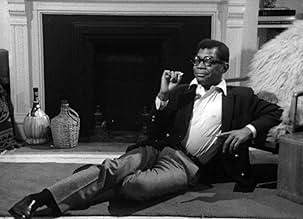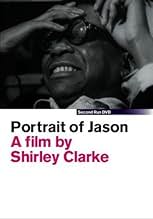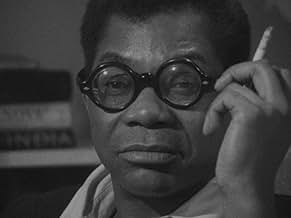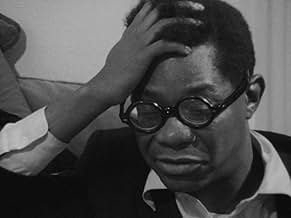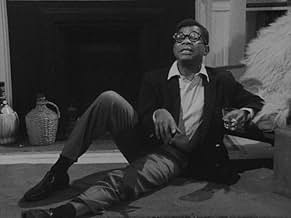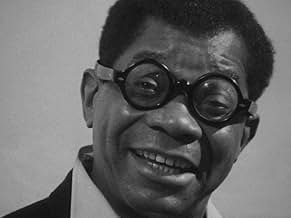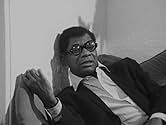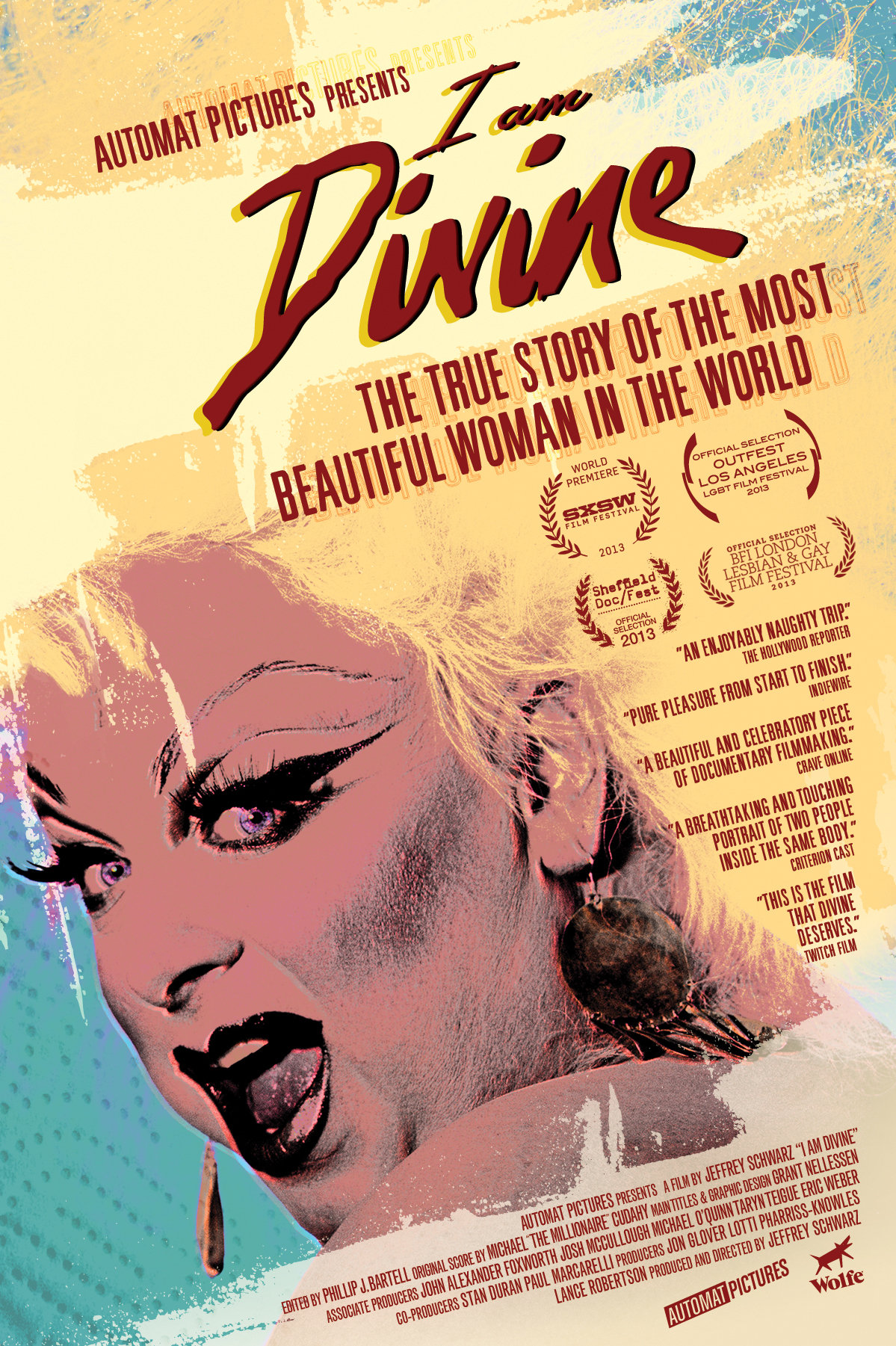IMDb RATING
7.0/10
1.6K
YOUR RATING
Black gay prostitute Jason Holliday is rigorously interviewed on his story and character, revealing nuanced truths about life and art.Black gay prostitute Jason Holliday is rigorously interviewed on his story and character, revealing nuanced truths about life and art.Black gay prostitute Jason Holliday is rigorously interviewed on his story and character, revealing nuanced truths about life and art.
- Director
- Stars
- Awards
- 1 win total
Featured reviews
Shirley Clarke's film "Portrait of Jason" was recently shown on Turner Classic Movies and I think it's a good bet few of the viewers watched it to the end. Now I am not saying that's because it's a terrible film but it's really one that has super-limited appeal.
The film consists of a man who has re-christened himself 'Jason' talking to the camera at length. Occasionally, an unseen person asks him a question but otherwise, it's like you just wind up Jason and let him go! He's a black homosexual self-proclaimed 'hustler'-- which puts him in a VERY small minority back in the 1960s! Mostly he talks and talks about himself and is quite engaging in some ways...though after a while it comes off as a bit boring and you just want it to end.
For me, however, this was more interesting than to the average viewer. I used to be a psychotherapist and Jason reminds me of some of the hustlers I worked with--with his broad and colorful language, his attempt to seduce the viewer and his unwillingness to really talk about himself in anything more than a superficial manner. You don't hear his pain because he's talking so much and trying to entertain in an attempt NOT to talk about his pain. And, being black and gay in the 60s, he must have seen more than his share of pain. Sad, really to watch him laugh and try to entertain but doing no more--even when talking about things that should have been traumatic. And even when confronted by the unseen narrator towards the end of the documentary, he seemed scared to dig deeper. This portion is a bit painful to watch--and he then forces himself to start laughing. Perhaps that is the point of the film-- about what Jason does to avoid digging deep within himself.
I am not going to give this a numerical score--it defies anyone's ability to compare it to traditional films. My feeling is that it's more a social-psychological portrait for a tiny audience and an interesting experiment but no more. Perhaps if the film had been edited down some it might have had more appeal.
The film consists of a man who has re-christened himself 'Jason' talking to the camera at length. Occasionally, an unseen person asks him a question but otherwise, it's like you just wind up Jason and let him go! He's a black homosexual self-proclaimed 'hustler'-- which puts him in a VERY small minority back in the 1960s! Mostly he talks and talks about himself and is quite engaging in some ways...though after a while it comes off as a bit boring and you just want it to end.
For me, however, this was more interesting than to the average viewer. I used to be a psychotherapist and Jason reminds me of some of the hustlers I worked with--with his broad and colorful language, his attempt to seduce the viewer and his unwillingness to really talk about himself in anything more than a superficial manner. You don't hear his pain because he's talking so much and trying to entertain in an attempt NOT to talk about his pain. And, being black and gay in the 60s, he must have seen more than his share of pain. Sad, really to watch him laugh and try to entertain but doing no more--even when talking about things that should have been traumatic. And even when confronted by the unseen narrator towards the end of the documentary, he seemed scared to dig deeper. This portion is a bit painful to watch--and he then forces himself to start laughing. Perhaps that is the point of the film-- about what Jason does to avoid digging deep within himself.
I am not going to give this a numerical score--it defies anyone's ability to compare it to traditional films. My feeling is that it's more a social-psychological portrait for a tiny audience and an interesting experiment but no more. Perhaps if the film had been edited down some it might have had more appeal.
A worthwhile person to capture on film (black and openly gay in the mid 60s) but the director needed boil Jason's stories down into a rough script and shoot off of it.
With a shooting outline and some thought to where and how the subject was going to be shot, the movie would have been dramatically better.
Still worth a watch? Yes, of course. It is a historical document like no other and worth taking in for that reason alone.
With a shooting outline and some thought to where and how the subject was going to be shot, the movie would have been dramatically better.
Still worth a watch? Yes, of course. It is a historical document like no other and worth taking in for that reason alone.
Jason Holliday is a man that has his share of pain and has his own ways to cope with it all.
He was interesting, but I kept feeling I was witnessing the exploitation of Jason by rich white upper class artsy woman Shirley Clarke. Shirley like many others, found a subject to exploit. So that she -without a story - could have a story. It did not feel ethical, it didnt feel good to watch it in this way. In these days and times, Jason could have done it himself, or maybe by someone in a sincere way. Exploitation like this is sadly still done to this day. Most don't seem to be able to see or feel it. Since most of the audiences of these kind of movies/documentaries are people from the same background as Shirley.
I first saw this strange little gem 10/19/15 on TCM on demand. From 1967 and directed by Shirley Clarke, the movie can be described simply: just one person, Jason Holliday, in front of the camera, talking about himself, getting drunk and stoned. No music, no clever editing or camera effects.
Born Aaron Payne, he explains the name change as he episodically accounts for his life as gay man, prostitute, aspiring entertainer. On film Holliday's life story is more patter than coherent narrative, an entertaining collection of riffs edited by Ms. Clarke. The result is not far removed from a standup routine by Holliday's contemporary Lenny Bruce, already dead a year before the movie's release date. Keeping the camera on one guy alone for nearly two hours may tear a page or two from some movie-making rule book. And yet, although "Portrait of Jason" verges on the avant garde, I experienced the film as something primordial, with Jason's life story as ancient as the Satyricon of Petronius, as familiar as the biography of Lazarillo de Tomes.
"Portrait of Jason" is more than a lesson in literary history. The film manages to show the audience a life, a real person, an amusing character. If some especially talented actors can indeed hold audience interest even when reading the phone book, Holliday proved that he can keep us interested after Shirley Clarke merely(!) rolls twelve hours of film and sound on him. Holliday had been there all along, really. As Ms. Clarke's arresting (and, I imagine, often arrested) subject, he seems to have been shooting and simultaneously watching his own self-created movie long before Ms. Clarke trained her lens and microphone on him.
I had never heard of this movie before I decided to take a look the other night. I found myself laughing at the guy's stories before the ten minute mark. I saw the movie again to be sure I hadn't been as drunk watching as Holliday was talking. Again I laughed and laughed some more.
My only objection on the second go-round was the off-camera baiting that took place toward the end of the film. If Holliday needed prodding to continue with his monologue as fatigue and inebriation evidently increased, that sort of thing is best left on the cutting room floor. At least this documentary film seems to have had its own fourth wall that belonged intact.
Still, you have to admire the gifted filmmaker who let us behold a man exercising his God-given right to take a Holliday from Payne!
Born Aaron Payne, he explains the name change as he episodically accounts for his life as gay man, prostitute, aspiring entertainer. On film Holliday's life story is more patter than coherent narrative, an entertaining collection of riffs edited by Ms. Clarke. The result is not far removed from a standup routine by Holliday's contemporary Lenny Bruce, already dead a year before the movie's release date. Keeping the camera on one guy alone for nearly two hours may tear a page or two from some movie-making rule book. And yet, although "Portrait of Jason" verges on the avant garde, I experienced the film as something primordial, with Jason's life story as ancient as the Satyricon of Petronius, as familiar as the biography of Lazarillo de Tomes.
"Portrait of Jason" is more than a lesson in literary history. The film manages to show the audience a life, a real person, an amusing character. If some especially talented actors can indeed hold audience interest even when reading the phone book, Holliday proved that he can keep us interested after Shirley Clarke merely(!) rolls twelve hours of film and sound on him. Holliday had been there all along, really. As Ms. Clarke's arresting (and, I imagine, often arrested) subject, he seems to have been shooting and simultaneously watching his own self-created movie long before Ms. Clarke trained her lens and microphone on him.
I had never heard of this movie before I decided to take a look the other night. I found myself laughing at the guy's stories before the ten minute mark. I saw the movie again to be sure I hadn't been as drunk watching as Holliday was talking. Again I laughed and laughed some more.
My only objection on the second go-round was the off-camera baiting that took place toward the end of the film. If Holliday needed prodding to continue with his monologue as fatigue and inebriation evidently increased, that sort of thing is best left on the cutting room floor. At least this documentary film seems to have had its own fourth wall that belonged intact.
Still, you have to admire the gifted filmmaker who let us behold a man exercising his God-given right to take a Holliday from Payne!
Shirley Clarke admitted she made films for people who already understood her wavelength. While that cannot be used as an excuse, it does make Portrait of Jason a challenge. Will you dismiss it as the nauseous ramblings of an ageing black homosexual prostitute? Or might you even pronounce it, as revered Swedish director Ingmar Bergman did, "The most fascinating film I've ever seen"? There are films that you enjoy. And films that stick with you. Ones that make an impression even if it wasn't a pleasant one. This is maybe one of those. Jason, talking of his own life, couldn't have put it better. "It only hurts when you think of it. And if you're real you'll think of it a long, long time." The moral tightrope the filmmakers tread - pushing a man to the brink of despair - is mesmerising. The techniques, which also question the nature of documentary itself, leave many questions unanswered.
There is affectionate voyeurism that we have all maybe engaged in. When friends get drunk or do silly things. There's a saying, "God remembers us by our mistakes, not our perfections." But what of more uncomfortable revelations? Made unwillingly or willingly? Does the sanctimonious label of 'truth-telling' justify hurt? Does complicity? Today we are bombarded with Jerry Springer style TV 'confessions'. We are inured to 'reality shows'. In the late 60s, documentary film-making was enjoying new found freedoms in showing 'truth'. Portrait of Jason has rightly been described as a journey into a man's soul. But it mirrors the transformation of voyeurship with the advent of the video. "The very thing that was trying to be hidden is now the thing that is trying to be exposed," Clarke explained. Where the audience was the watcher, the filmmaker is now the watcher. In Portrait of Jason, putting something on film changes the dynamic intensity what was boring in real life becomes fascinating once it is filmed and edited.
The film-making process of Portrait of Jason deliberately interacts with the subject. Not to manipulate truth, but to elicit a deeper truth. It has been called 'self-reflexive documentary.' The eponymous Jason introduces himself at length, but later contradicts himself, admitting his real name is Aaron Payne. The process has become part of the subject matter. What can be believed? Portrait of Jason is Warholian in its simplicity. A middle-aged black man talks on camera for an hour and three-quarters. But the bite is that although willing, he is obviously not only under the influence of drink and drugs: he is tired and repeatedly gets up to go home. That it has been edited down from twelve hours of footage is testimony to the reality of the camera's lengthy cross-examination.
Jason Holliday is a remarkable individual. And also a nobody. For him, this film is an opportunity to be immortalised. "It is a nice feeling," he explains. Something he will always have and treasure.
At the beginning, Jason revels in self-caricature. The fact that he is a drug-user and a prostitute. "I'm a stoned whore!" he boasts with camp exuberance. We learn he grew up with an overbearing father which he describes with the wit of a stand-up comedian. He makes amusing stories out of his road to homosexuality. He always wanted to be a stage performer and delights in showing us his material, donning a hat to do an impression of Mae West.
But the 'evening' wears on. Jason's ability to project his misery as something we can laugh at wears thin. He is tired. But he still rises to the call for 'material'. This, together with the questioning, connects to his desperate side. He wants to show us he is proud of his life. We are drawn in but at the same time maybe not wanting to know. "How did you get the 75 cents for the bed?" When Jason breaks down and cries we know we have hit rock bottom. Documentary 'truth' by a process of wearing down. But is it fair to do this to any human being? I leave the auditorium with a bad taste in my mouth. But days later I realise the film has made a deeper impression on me than many I have seen. The insights into racism in the U.S. ("The great problem of our time," as Shirley Clarke called it) are humbling. Certain phrases stick in my mind. "Are you lonely?" they asked him. "I'm desperate," he replies, "but I'm cool!" And in spite of the hell he has been through he says he is, "Happy about the whole thing," when asked about the filming. It was maybe not the immortalisation he expected. But Jason Holliday will certainly never be forgotten. I start to think that Clarke did him a kindness. Then I read how, in a 1983 interview, she had admitted, "I started out that evening with hatred, and there was a part of me that was out to do him in, get back at him, kill him." Did my previous judgement hold true? Even if her motives were not as clean as I had given her credit for? It seems to me that Clarke maybe uses Holliday as a means to an end, even if that end is breaking new ground in film-making. Films such as Capturing the Friedmans, many years later, although made with the family's consent, would expose their subjects to a scrutiny that was not always favourable. Yet elements of the moral uneasiness of that much later documentary are apparent in Portrait of Jason. In Freidmans, we justify intrusion because of willingness and the possibility that serious harm has been committed. But Jason doesn't stand accused. Then again, it is one of the earliest films to look at a gay protagonist in an open and (arguably) sympathetic manner. It may be that the benefits outweigh any harm. He forever tells us, "I'll never tell." But evidently needs little encouragement to do so.
There is affectionate voyeurism that we have all maybe engaged in. When friends get drunk or do silly things. There's a saying, "God remembers us by our mistakes, not our perfections." But what of more uncomfortable revelations? Made unwillingly or willingly? Does the sanctimonious label of 'truth-telling' justify hurt? Does complicity? Today we are bombarded with Jerry Springer style TV 'confessions'. We are inured to 'reality shows'. In the late 60s, documentary film-making was enjoying new found freedoms in showing 'truth'. Portrait of Jason has rightly been described as a journey into a man's soul. But it mirrors the transformation of voyeurship with the advent of the video. "The very thing that was trying to be hidden is now the thing that is trying to be exposed," Clarke explained. Where the audience was the watcher, the filmmaker is now the watcher. In Portrait of Jason, putting something on film changes the dynamic intensity what was boring in real life becomes fascinating once it is filmed and edited.
The film-making process of Portrait of Jason deliberately interacts with the subject. Not to manipulate truth, but to elicit a deeper truth. It has been called 'self-reflexive documentary.' The eponymous Jason introduces himself at length, but later contradicts himself, admitting his real name is Aaron Payne. The process has become part of the subject matter. What can be believed? Portrait of Jason is Warholian in its simplicity. A middle-aged black man talks on camera for an hour and three-quarters. But the bite is that although willing, he is obviously not only under the influence of drink and drugs: he is tired and repeatedly gets up to go home. That it has been edited down from twelve hours of footage is testimony to the reality of the camera's lengthy cross-examination.
Jason Holliday is a remarkable individual. And also a nobody. For him, this film is an opportunity to be immortalised. "It is a nice feeling," he explains. Something he will always have and treasure.
At the beginning, Jason revels in self-caricature. The fact that he is a drug-user and a prostitute. "I'm a stoned whore!" he boasts with camp exuberance. We learn he grew up with an overbearing father which he describes with the wit of a stand-up comedian. He makes amusing stories out of his road to homosexuality. He always wanted to be a stage performer and delights in showing us his material, donning a hat to do an impression of Mae West.
But the 'evening' wears on. Jason's ability to project his misery as something we can laugh at wears thin. He is tired. But he still rises to the call for 'material'. This, together with the questioning, connects to his desperate side. He wants to show us he is proud of his life. We are drawn in but at the same time maybe not wanting to know. "How did you get the 75 cents for the bed?" When Jason breaks down and cries we know we have hit rock bottom. Documentary 'truth' by a process of wearing down. But is it fair to do this to any human being? I leave the auditorium with a bad taste in my mouth. But days later I realise the film has made a deeper impression on me than many I have seen. The insights into racism in the U.S. ("The great problem of our time," as Shirley Clarke called it) are humbling. Certain phrases stick in my mind. "Are you lonely?" they asked him. "I'm desperate," he replies, "but I'm cool!" And in spite of the hell he has been through he says he is, "Happy about the whole thing," when asked about the filming. It was maybe not the immortalisation he expected. But Jason Holliday will certainly never be forgotten. I start to think that Clarke did him a kindness. Then I read how, in a 1983 interview, she had admitted, "I started out that evening with hatred, and there was a part of me that was out to do him in, get back at him, kill him." Did my previous judgement hold true? Even if her motives were not as clean as I had given her credit for? It seems to me that Clarke maybe uses Holliday as a means to an end, even if that end is breaking new ground in film-making. Films such as Capturing the Friedmans, many years later, although made with the family's consent, would expose their subjects to a scrutiny that was not always favourable. Yet elements of the moral uneasiness of that much later documentary are apparent in Portrait of Jason. In Freidmans, we justify intrusion because of willingness and the possibility that serious harm has been committed. But Jason doesn't stand accused. Then again, it is one of the earliest films to look at a gay protagonist in an open and (arguably) sympathetic manner. It may be that the benefits outweigh any harm. He forever tells us, "I'll never tell." But evidently needs little encouragement to do so.
Did you know
- TriviaThis film was previously thought to have been lost, until a 16 mm print of the film was discovered at the Wisconsin Center for Film and Theater Research in 2013 and has since been restored by the Academy Film Archive, Milestone Films and Modern Videofilm.
- How long is Portrait of Jason?Powered by Alexa
Details
- Release date
- Country of origin
- Language
- Also known as
- Портрет Джейсона
- Filming locations
- Production companies
- See more company credits at IMDbPro
- Runtime1 hour 45 minutes
- Color
- Sound mix
Contribute to this page
Suggest an edit or add missing content

